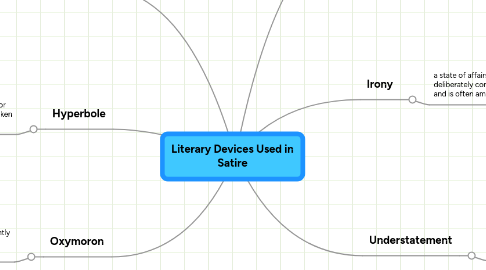
1. Parody
1.1. imitation of the style of a particular writer, artist with exaggeration for comical effect.
1.1.1. (p.4)" Pangloss taught metaphysico-theologico-cosmo-nigology."
1.1.1.1. Voltaire is satirizing philosophers who look for showy knowledge rather than realistic ones.
1.1.1.2. This is an example of parody because it is making fun of Leibniz in a very comical way by exaggerating the words.
1.1.2. (p.41)"'..Ah what would Maitre Pangloss say now, if he could see how men live in a state of nature?"
1.1.2.1. Volataire is satirizing the idea of Rousseau's doctrine about the peaceful thought of mountain people.
1.1.2.2. This is an example of a parody because Voltaire is making fun of the doctrine of Rousseau by showing that in natural state are not pure or noble: they are cannibalistic.
2. Oxymoron
2.1. figure of speech in which apparently contradictory terms appear in conjunction.
2.1.1. (p.8) "...heroic butchery."
2.1.1.1. Voltaire is satirizing
2.1.1.2. This is an example of oxymoron because heroic and butchery are totally contradicting terms. A hero will save a life, but butchery is killing a life.
2.1.2. (p.79) "'that there is pleasure to be had in not taking pleasure?'"
2.1.2.1. New node
2.1.2.2. New node
2.1.2.3. This is satirizing the greed of the people in the world. How they can't satisfy with what they have.
2.1.2.4. This is an example of oxymoron because two opposite terms are used. One says pleasure and not taking pleasure. The two are totally contradictory terms.
3. Hyperbole
3.1. exaggerated statements or claims not meant to be taken literally.
3.1.1. (p.3) "The Baroness, who weighed approximately three hundred and fifty pounds..."
3.1.1.1. This is an example of hyperbole because it is greatly exaggerated. A woman at this time of this can't possibly weigh three hundred and fifty pounds because they were all small in height, compared to us today.
3.1.1.1.1. Voltaire is satirizing the overly exaggerated confidence of the royals.
3.1.2. (p.44)"...a platter containing three hundred birds of paradise and another of six hundred humming birds..."
3.1.2.1. This is an example of hyberbole because it does not make sense that six hundred birds can be on one dish. It is greatly exaggerated.
3.1.2.2. Voltaire is satirizing the perfect situation that is formed in this scene because he believes there is no Utopia.
4. Allusion
4.1. figure of speech using representation to represent place, person, event, etc.
4.1.1. (p.14) "...than they feel the earth tremble beneath them... Thirty thousand inhabitants without regard to age or sex are crushed beneath the ruins."
4.1.1.1. This is an allusion of a true earthquake that happened at Lisbon in November 1, 1755. Voltaire used this to satirize the fact of "best of all possible worlds" and to show that events happen naturally.
4.1.1.2. This selection is an example of allusion because it has used an event to represent a real event that happened in history.
4.1.2. (p.20) "'The Grand Inquisitor noticed me one day at Mass; he olged me throughout the service, and then sent word that he had to speak to me on private business... The Inquisitor threatened him with an auto-da fe."
4.1.2.1. This is satirizing the religious practice, auto-da fe and the cruelty of the religious people.
4.1.2.2. This is an example of an allusion because auto-da fe was a real practice that began in the middle ages. Voltaire used this event to represent the auto-da fe.
5. Understatement
5.1. presenting something as being smaller, worse or less important than it actually is.
5.1.1. (p.11) "' It is an indispensable feature of the best of all possible worlds, a necessary ingredient...'"
5.1.1.1. Voltaire is satirizing the thoughts of a few optimistic, Enlightenment thinkers.
5.1.1.2. This is an example of understatement because Pangloss is talking about his syphilis as if it is nothing so serious, but the will of the world.
5.1.2. (p.15) "'This is all for the best,' he said. ' For if there is a volcano beneath Lisbon, then it cannot be anywhere else, for it is impossible for things to be elsewhere than where they are...'"
5.1.2.1. This is an example of an understatement because , again, Pangloss talks about this serious situation like this volcanic disaster in a casual way. Saying this is for the good of everyone.
5.1.2.2. Volataire is satirizing the thoughts of the Enlightenment thinker of his time.
6. Irony
6.1. a state of affairs or an event that seems deliberately contrary to what one expects and is often amusing as a result.
6.1.1. (p.41)"' so you are thinking of eating Jesuit today? A splendid idea; nothing more proper than to treat your enemies in this fashion... natural law teaches us to kill our neighbors.."
6.1.1.1. Voltaire is satirizing the corrupt minds of religious people.
6.1.1.2. This is an example of irony because Cacambo is supposed to disagree with cannibalism as a Christian, but ironically Cacambo is agreeing to eating people.
6.1.2. (p.3) "This Baron was one of the most powerful lords of Westphalia, for his castle had a gate and windows."
6.1.2.1. Voltaire is satirizing authority figures by making fun of the place they live. This explanation might show that the Baron is actually not really rich but acting like he is rich.
6.1.2.2. This is an example of irony because if we think of castles we imagine a lot of gates and beautiful windows. However, the narrator explains the castle as if it is very simple.
